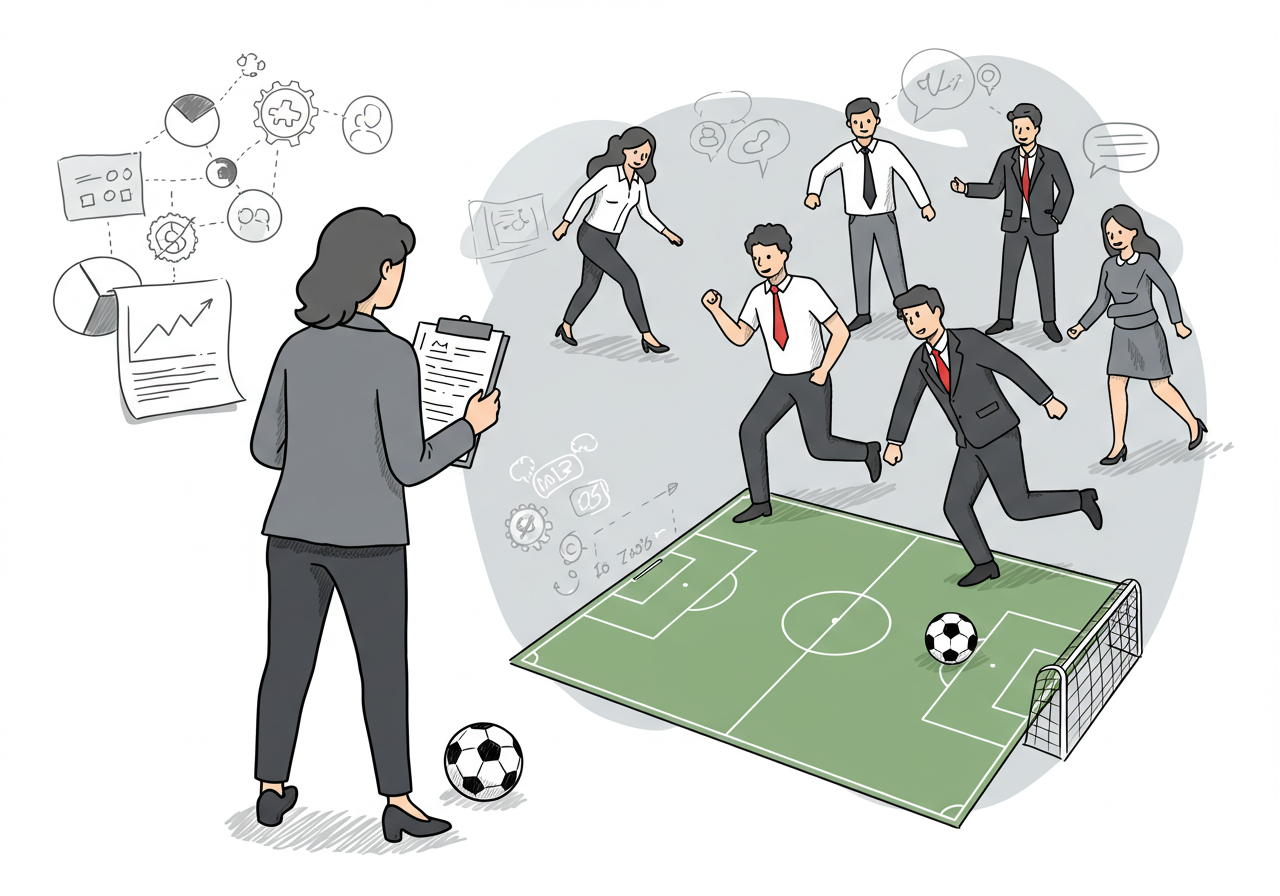Finding Top Talent: What Soccer Tryouts Taught Me About Building Business Teams

The Field of Assessment
This weekend, my soccer club hosted tryouts for nearly 100 boys aged 13-14. As a coach, I watched these young athletes showcase their skills in hopes of making our top teams, a striking realization hit me: the process of evaluating soccer talent mirrors how we should identify and build high-performing teams in the workplace.
The parallels were undeniable. In both settings, we’re making critical decisions about talent with limited observation time, looking for specific indicators of future success, and trying to build cohesive teams rather than just collecting individual all stars.
The Five Key Traits of Top Performers
When evaluating soccer players during tryouts, we place them in game-like scenarios and watch for five essential traits. These same traits, I’ve discovered, translate remarkably well to the business world:
1. Technical Ability
On the field: We assess individual skills like sprinting, dribbling, passing, shooting, and stamina—what the player can physically execute.
In business: This translates to hard skills and competencies specific to the role. Can they code? Do they understand financial modeling? Are they proficient in project management methodologies?
2. Teamwork
On the field: Soccer is the ultimate team sport. Even the brightest stars need strong teammates to shine.
In business: We need collaborators who elevate others, communicate effectively, and contribute to a positive culture. Individual brilliance rarely overcomes dysfunctional teamwork.
3. Game IQ or Intelligence
On the field: We watch how players understand the game, react to different situations, read developing plays, and adapt to changing conditions.
In business: This manifests as problem-solving ability, adaptability, and strategic thinking—how candidates approach challenges and navigate complexity.
4. Mentality
On the field: How do players handle mistakes? Do they support struggling teammates or criticize them? How do they celebrate successes?
In business: This reveals resilience, emotional intelligence, and attitude. Does the candidate take ownership of mistakes? Do they lift others up or tear them down? How do they handle pressure?
5. Movement
On the field: We observe positioning, anticipation, and proactivity—do they get into good positions, anticipate the next play, and move creatively?
In business: This translates to what I call “Bias for Action”—are they critical thinkers, proactive problem-solvers who initiate rather than wait for direction?
Creating “Tryouts” in the Interview Process
The challenge in business is that we don’t typically have “tryouts” like in sports. Instead, we must create interview experiences that reveal these qualities in condensed timeframes.
Designing Revealing Questions and Scenarios
To evaluate business candidates effectively, I use a mix of open-ended questions and scenario-based discussions that map to our five key traits:
For Technical Ability: “Tell me about a time you implemented [relevant skill] to solve a complex problem.” Look for: Specific details, clear outcomes, and first-person language (“I did X”) rather than vague generalities.
For Teamwork: “Describe a successful cross-functional project you contributed to. What was your role, and how did you collaborate with others?” Look for: Emphasis on collective achievements, understanding of team dynamics, and appreciation for diverse contributions.
For Intelligence/Problem-Solving: “Walk me through how you’d approach [relevant business challenge].” Look for: Structured thinking, consideration of multiple factors, critical thinking and creative problem-solving approaches.
For Mentality: “Tell me about a significant professional setback and how you responded.” Look for: Resilience, learning orientation, accountability, and constructive responses to failure.
For Bias for Action: “Share an example of when you identified and addressed a problem before it became critical.” Look for: Phrases like “I would find out ahead of time” versus “I would wait and see” or “I would ask my leader what to do.”
Reading Between the Lines
Strong candidates typically provide detailed responses with specific examples, speak in the first person about their contributions, and describe the problem, actions and outcomes. They naturally reveal their approach to collaboration, critical thinking, problem-solving, and initiative-taking through their stories.
Weaker candidates often speak in generalities, use “we” without clarifying their specific role, struggle to provide concrete examples, or demonstrate reactive rather than proactive tendencies.
The Winning Formula
In both soccer and business, creating high-performing teams requires looking beyond surface skills to deeper qualities that determine long-term success. By structuring interviews to evaluate all five key traits—technical ability, teamwork, intelligence, mentality, and bias for action—we can identify talent that will truly elevate our teams.
The next time you’re conducting interviews, consider approaching them like a coach at tryouts: create scenarios that reveal true capabilities, watch how candidates “move” through problems, and assess not just what they can do, but how they choose to do it and who they are while doing it.
After all, whether on the field or in the office, the best teams are built with players who have both the skills to perform and the character to excel.